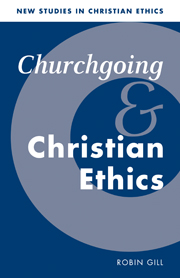Book contents
- Frontmatter
- Contents
- List of tables
- Preface
- List of abbreviations
- Introduction
- PART ONE THE THEORETICAL CONTEXT
- PART TWO THE EVIDENCE
- 4 The British Household Panel Survey
- 5 Faith in British Social Attitudes surveys
- 6 Moral Order in British Social Attitudes surveys
- 7 Love in British Social Attitudes surveys
- PART THREE THE IMPLICATIONS
- Postscript
- Works cited
- Index
4 - The British Household Panel Survey
Published online by Cambridge University Press: 02 December 2009
- Frontmatter
- Contents
- List of tables
- Preface
- List of abbreviations
- Introduction
- PART ONE THE THEORETICAL CONTEXT
- PART TWO THE EVIDENCE
- 4 The British Household Panel Survey
- 5 Faith in British Social Attitudes surveys
- 6 Moral Order in British Social Attitudes surveys
- 7 Love in British Social Attitudes surveys
- PART THREE THE IMPLICATIONS
- Postscript
- Works cited
- Index
Summary
So far this book has reviewed data most of which has already been published, even if much has been forgotten or hidden in archives. Taken as a whole it suggests that churchgoing has more effect upon beliefs and values than is often admitted by sociologists or even by many theologians. Three areas in particular – Christian belief, teleology and altruism – appear to be especially associated with regular churchgoing. It is time now to test this association and to measure its strength more accurately against an entirely new set of data.
The British Household Panel Survey (BHPS) was established with a grant from the Economic and Social Research Council to the Research Centre on Micro-social Change at the University of Essex in 1989. BHPS is designed as an annual survey of each member over 15 years old of a nationally representative sample of more than 5,000 households, making a total of approximately 10,000 individual interviews. The same adults are interviewed in each year and children are interviewed once they reach the age of 16. Eventually it should be possible to map longitudinal changes amongst the respondents. The survey sometimes includes an additional sample of 11–15-year-old household members. Alongside a host of other social indicators, the annual survey usually includes a question about attendance at religious services and always includes questions about whether or not respondents are members of, and/or active within, religious groups. Given its size and scope, this largely untapped religious resource offers an invaluable basis for research.
- Type
- Chapter
- Information
- Churchgoing and Christian Ethics , pp. 97 - 121Publisher: Cambridge University PressPrint publication year: 1999
- 1
- Cited by



